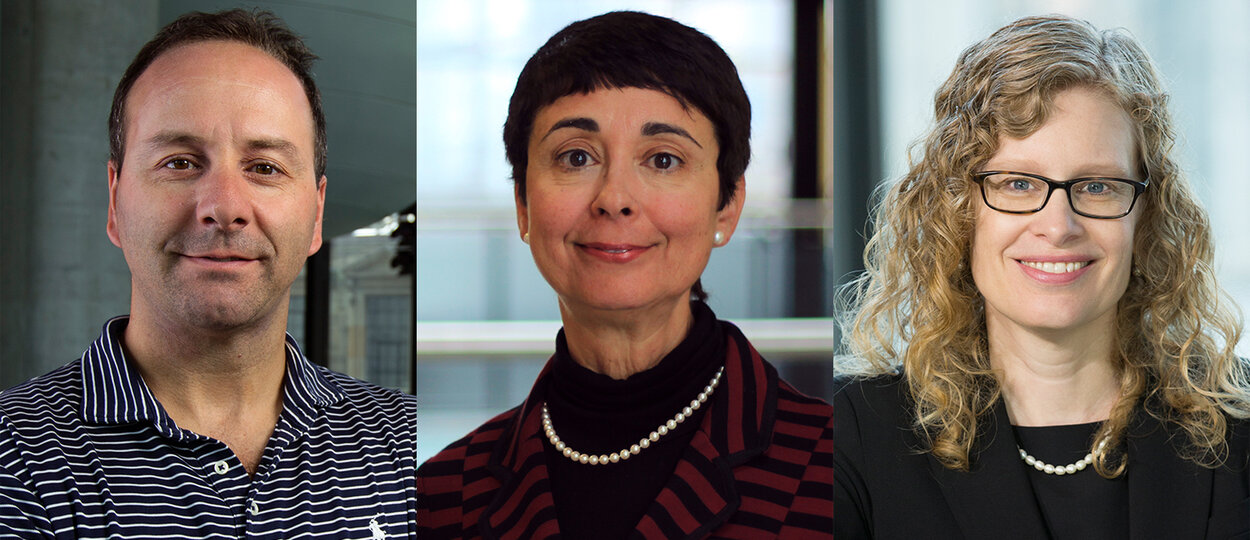New grants totaling $2 million support diverse range of research projects
Three researchers based at the Leslie Dan Faculty of Pharmacy (LDFP) have received new funding through the Canadian Institutes of Health Research (CIHR) Project Grants. The new funding represents an investment of nearly $2 million over five years.
“It’s a very difficult funding climate right now, and this support from CIHR is a great success,” says Stéphane Angers, Professor and Associate Dean, Research at the LDFP.
“It really highlights the quality of the research being done at our Faculty.”
Angers is one of the newly funded researchers. He and his team have been studying a cell signalling pathway found in certain blood vessel cells that helps to regulate the protective barriers in the brain and retina. These barriers are meant to be impenetrable, but in several disease contexts the blood-brain and blood-retina barriers become leaky.
In earlier work, the Angers lab developed a molecule that could activate the cell receptor for this signalling pathway and reduce the permeability of these barriers. They have already tested the molecule in a mouse model of eye disease, and they are now extending this work to examine whether the molecule is effective at repairing brain damage from stroke, also in a mouse model, and could be developed as new treatment.
“We have proof of principle in the retina already, but we haven’t tested this molecule in the brain yet,” says Angers. “This new grant will allow us to explore whether our molecule may be effective for brain diseases such as stroke.”
Professor Reina Bendayan, whose application was ranked first out of 50 applications in her committee, will examine whether compounds used to treat Type 2 diabetes are able to reverse HIV-associated brain inflammation and neurological disorders. These complications of HIV can significantly affect the quality of life of people living with the disease.
Recently, Bendayan’s team has been examining these compounds’ anti-inflammatory and anti-viral effects in mouse models of HIV. Bendayan and her team will now study how the compounds activate these anti-inflammatory and anti-viral pathways in mouse models and reverse the neurological complications. She will also examine HIV-associated brain inflammation in brain tissues from infected macaques and humans.
“These compounds are able to penetrate the brain and appear very promising in treating HIV-associated brain inflammation in small animal models,” she says. “If these compounds are effective in reversing neurological complications in animal models, it’s an important step toward moving them to the clinic.”
Professor Heather Boon’s new funding will help policy makers and medical educators better understand the relatively new medical specialty of integrative medicine (IM). This specialty, which incorporates complementary medicine into practice of medical doctors, was officially recognized several years ago, but it is not clear whether this specialty is resulting in more recognition for complementary medicine within the health care system or limiting its influence.
Boon – an expert in the use, regulation, safety and effectiveness of natural health products and traditional/complementary medicine – aims to get a better understanding of how integrative medicine has emerged as a specialty and how it is taught and professionalized, as well as better understand the characteristics of IM physicians in Canada and US. She and her team will survey a large number of IM physicians, interview IM physician leaders and examine IM policies and training.
“This research project is being led by my post-doctoral fellow, Nadine Ijaz, and will support her continued investigations in the field of Traditional, Complementary and Integrative Medicine,” says Boon. “It is important to help us understand whether the IM specialty represents a paradigm shift in medicine or whether these changes will actually limit the practice of complementary medicine by medical doctors and others who practice these therapies.”
By Eileen Hoftyzer
More News
Image

Dean Lisa Dolovich reappointed for second term
Professor Lisa Dolovich has been reappointed for a second term as Dean of the Leslie Dan Faculty of Pharmacy, University of Toronto, effective July 1, 2025, to December 30, 2030.
Read More
Image

Pharmacy Summer Camp gives high school students insight into pharmacy profession
A new summer camp based at the faculty will give high school students a range of experiences in pharmacy and pharmaceutical sciences.
Read More
Image

Team GloveLift wins 2025 Business Plan Competition with innovative medical device
PharmD students win $5,000 prize for their innovative medical device concept aimed at improving patient care.
Read More
